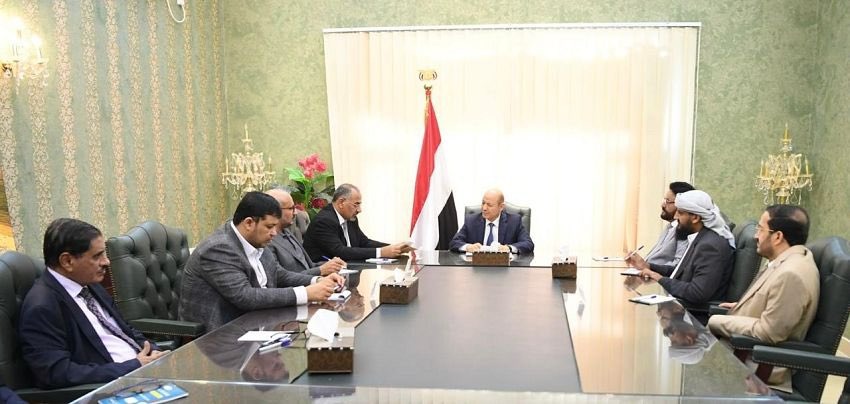


Barran Press
The Yemeni Presidential Leadership Council convened on Thursday, July 18, 2024, to discuss the latest military developments, the readiness of the armed forces, and the preparedness of military formations to counter threats from the Houthi group, internationally designated as a terrorist organization.
The meeting, held via video conference, was attended by Prime Minister Dr. Ahmed Awad bin Mubarak, Defense Minister Lieutenant General Mohsen al-Da'ari, and Chief of Staff Lieutenant General Saghir bin Aziz, according to the official Yemeni news agency Saba.
The council discussed the latest economic, social, and military developments in light of continued threats from the Houthis, their gross human rights violations, and the repercussions of their terrorist attacks on oil facilities and international merchant ships.
The council was briefed on the "military situation of the armed forces in all their formations and their high readiness to deter any escalation by the Houthis on various fronts."
The council commended "the high vigilance demonstrated by the armed forces and all military formations in confronting Houthi attacks and thwarting their repeated attempts to return the situation to a full-blown war, regardless of the long-suffering of the Yemeni people."
The Presidential Leadership Council reiterated its call on the Houthis to exercise reason, engage positively with the good-faith efforts led by Saudi Arabia to achieve peace, stop the bloodshed, prioritize the interests of the Yemeni people over all other interests, cease their blatant exploitation of the Palestinian people's suffering and their just cause, and empower Yemenis to build their own just state that respects human rights and the rule of law.
The council also reaffirmed its support for the economic and service reforms being led by the government to improve living conditions and strengthen the national currency, in close coordination with regional and international partners.
The council praised "the economic and development interventions of our brothers in the Coalition to Support Legitimacy led by the Kingdom of Saudi Arabia, to alleviate the suffering of the Yemeni people, and the continued commitment of the state to its essential obligations, primarily the payment of salaries, the supply of goods, and basic services."
Recently, the leader of the Houthi group, internationally designated as a terrorist organization, threatened to resume attacks on vital targets in Saudi Arabia, accusing it of being behind the steps taken by the Central Bank in Aden, the declared temporary capital of the country (southern Yemen).
On May 30, the Yemeni Central Bank in Aden, the declared temporary capital of the country, issued a decision to stop dealing with six Yemeni banks and financial institutions after the expiry of a 60-day deadline for them to implement its decision to relocate their main headquarters to Aden.
Simultaneously, the bank issued another decision calling on all individuals, commercial establishments, companies, other entities, and financial and banking institutions holding old banknotes printed before 2016 of all denominations to deposit them within a maximum period of 60 days from the date of the announcement.
The Central Bank continued its measures to counter the economic measures taken by the Houthi group, internationally designated as a terrorist organization, against the banking sector, which cast a shadow over the economic situation and led to a decline in the value of the Yemeni rial in areas under government control.
Through decisions issued by Governor Ahmed al-Ma'bqi, the Central Bank revoked the licenses of 26 exchange companies last week and ordered the closure of their branches indefinitely for violating bank decisions and instructions.
These decisions came after two previous decisions imposing a unified network for domestic remittances, prohibiting transactions with 12 unlicensed electronic payment entities, and permanently halting operations in domestic money transfer networks owned by banks, financial institutions, or exchange companies operating in Yemen.
These "decisive" decisions come amid regional and international pressure led by the United Nations for the Central Bank to back down from its steps aimed at imposing its legal status and control over the banking sector and fulfilling its duty to supervise banks and combat money laundering and terrorist financing.
This mutual escalation also coincides with regional and international efforts to push for the signing of a roadmap to end the nine-year war, amid Yemeni concerns that this roadmap does not meet the aspirations of Yemenis for lasting and comprehensive peace.
On December 23, the United Nations announced that the Yemeni parties had reached understandings to commit to a set of measures, including implementing a ceasefire across Yemen, measures to improve living conditions in Yemen, and engaging in preparations for the resumption of an inclusive political process under the auspices of the United Nations.
The roadmap and peace efforts in Yemen have stalled due to attacks by the Houthi group, internationally designated as a terrorist organization, against merchant ships in the Red Sea, the Arabian Sea, and the Gulf of Aden since last November.